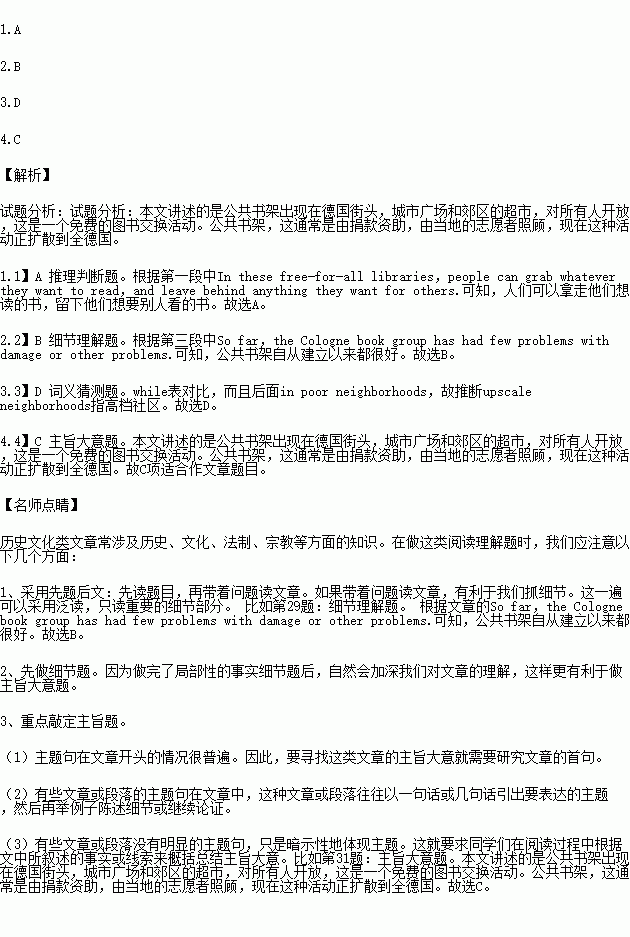题目内容
Public bookshelves are appearing across Germany on street corners,city squares and in suburban supermarkets. In these free-for-all libraries,people can grab whatever they want to read,and leave behind anything they want for others. There’s no need to register,no due date,and you can take or give as many as you want. “This project is aimed at everyone who likes to read .It is open for everybody,” Michael Aubermann,one of the organizers of the free book exchange said.
The western city’ s latest public shelf was put up next to Bayenturm. It is the fourth free shelf that Aubermann’ s group,the Cologne Citizen’s Foundation,has placed outside.“We set up our other outdoor shelves last year and it’s been working really well,” said Aubermann. The public bookshelves,which are usually financed by donations and cared for by local volunteer groups,have appeared independently of each other in many cities,suburbs and villages. Each shelf holds around 200 books and it takes about six weeks for a complete turnover,with all the old titles replaced by new ones.
Even commercial book stores and online book sellers seem to support the idea of free book exchanges.“We see this project rather as a sales promotion than as competition,”said Elmar Muether.“If books are present everywhere,it helps our business,too.”
So far,the Cologne book group has had few problems with damage or other problems. Aubermann said,“Propaganda (宣传) is the only kind of literature we do not allow here.”
At another bookshelf in the Bayenthal neighborhood,the lower shelves are reserved for children’s literature only.“It is important that we make it easy for everyone to participate in this ‘reading culture on the street’—from old readers to kids to immigrants,”Aubermann said.
While most of the shelves have so far been put up in upscale neighborhoods,Aubermann and the 20 volunteers who help look after the project are planning to put up future shelves in poor neighborhoods,where citizens often don’t have as much access to literature.
1.Which of the following is TRUE about the public bookshelves?
A. People can take the books and leave their books at will.
B. People can’ t borrow books unless they donate books.
C. People can borrow whatever they like after registering.
D. People have to return the books according to the required time.
2.According to Aubermann,the public bookshelves ________.
A. are financed by local volunteers
B. have been going well since their birth
C. were managed by the local government
D. will hold more books and take a shorter turnover
3.The underlined phrase “upscale neighborhoods” refers to ________.
A. communities that have many people
B. communities that have many tall buildings
C. communities that are free to live in
D. communities that are of high grade
4.Which might be the best title for the passage?
A. Public Reading Becomes Popular Worldwide
B. New Trends of Bookshelves in Germany
C. Public Bookshelves Spread Across Germany
D. Reading Culture on the Street in Europe
 学期复习一本通学习总动员期末加暑假延边人民出版社系列答案
学期复习一本通学习总动员期末加暑假延边人民出版社系列答案 芒果教辅暑假天地重庆出版社系列答案
芒果教辅暑假天地重庆出版社系列答案
